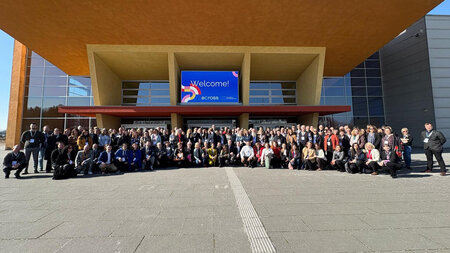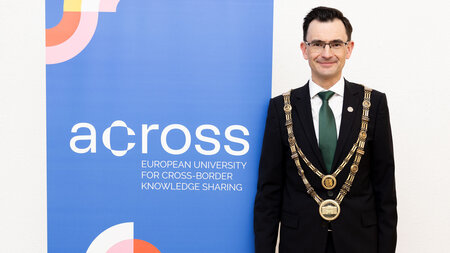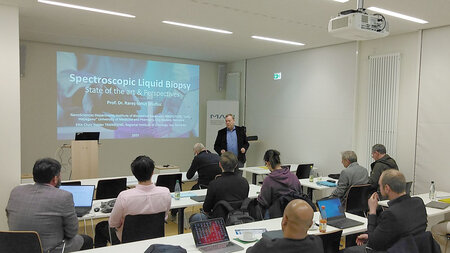New Appointments at the University
As of April 1, 2023, three professors have been newly appointed to Chemnitz University of Technology by the president and one professor was additionally nominated
-

As of April 1, 2023, Prof. Dr. Jan-Philipp Stein, Prof. Dr. Imma Curato, Prof. Dr. Marian Nebelin and Prof. Dr. Fleurianne Bertrand were newly appointed to Chemnitz University of Technology (from left) and Prof. Dr. Marian Nebelin was additionally nominated. Photos/Collage: private and Jacob Müller (Prof. Dr. Marian Nebelin)/Niklas Schindler
At the Faculty of Mathematics at Chemnitz University of Technology, Professor Dr. Fleurianne Bertrand assumed the position of head of the Professorship of Numeric Methods for Partial Differential Equations on April 1, 2023.
Prof. Dr. Imma Curato has also been appointed to the Faculty of Mathematics at Chemnitz University of Technology, effective April 1, 2023. In the future, she will head the Professorship of Statistics there.
Prof. Dr. Marian Nebelin has been both appointed and nominated as of April 1, 2023. Also at the Faculty of Humanities, he heads - now as a university professor - the Professorship of History of Antiquity and the Reception of Antiquity in Modern Times.
Prof. Dr. Jan-Philipp Stein takes over the Professorship of Media Psychology at the Faculty of Humanities.
About the person: Prof. Dr. Fleurianne Bertrand
Fleurianne Bertrand studied mathematics at Leibniz University Hannover and received her doctorate. In 2014, she completed her doctorate in Hannover with a dissertation on "Approximated Flux Boundary Conditions for Raviart-Thomas Finite Elements on Domains with Curved Boundaries and Applications to First-Order System Least Squares." She then worked as a research assistant and academic advisor at the University of Duisburg-Essen.
In 2018, she was called to the Junior Professorship for Computational Mathematics at Humboldt University Berlin, and in 2020, she took a position as an assistant professor at the University of Twente (NL) before accepting the appointment at Chemnitz University of Technology.
Her research interests are broad, as she develops efficient computational methods for solving partial differential equations, which she uses in collaborations with engineers to solve various problems. Her focus is on the development of adaptive, stress-based finite element methods that allow both accurate approximations of physical variables and automatic adaptation of the necessary computational grids, significantly reducing the required computing time.
Through her involvement in various research projects, she takes advantage of the fact that related computational methods can be applied in completely different areas. Through her mathematically grounded estimates, she ensures that faster computed approximations remain within a desired tolerance limit. At the University of Duisburg-Essen, for example, she developed a model for reliable prediction of crack progression due to thermally induced stresses in collaboration with Prof. Dr. Carolin Birk and Prof. Dr. Christian Meyer of TU Dortmund. The project was funded by the Mercator Research Center Ruhr (Mercur).
Later, she participated in an Antarctic expedition to study the mechanics of ice within an interdisciplinary team. Since her move to HU Berlin, Bertrand has also been working on solving so-called eigenvalue problems to determine the natural frequencies and vibration modes of a system.
Fleurianne Bertrand is looking forward to collaborations in the field of scientific computing within the Faculty of Mathematics at Chemnitz University of Technology. The well-posedness of the underlying partial differential equations also represents a connection point within the Faculty of Mathematics. Bertrand is also looking forward to interdisciplinary exchanges with the Faculty of Mechanical Engineering and the Faculty of Natural Sciences at Chemnitz University of Technology.
About the person: Prof. Dr. Imma Curato
Imma Curato studied Applied Mathematics at the University of Florence. In 2013, she completed her doctorate in Business Mathematics at the University of Pisa with the dissertation topic "Non-parametric estimation of volatility of volatility and leverage using integral transforms."
She then conducted research and taught as a research assistant at the University of Ulm in the field of Mathematical Statistics. She completed her habilitation in mathematics in 2021 and has since been working on a project funded by the German Research Foundation (DFG) on theory-guided machine learning before accepting the call to Chemnitz University of Technology.
Curato researches novel statistical methods for spatial-temporal data analysis. These methods are based on hybrid approaches that utilize stochastic models and data science techniques. In terms of applications, her research aims to develop video reconstruction methods that exploit dependencies between spatially and temporally adjacent pixels, as well as regression models for time series data used in environmental monitoring.
Prof. Curato is already looking forward to interdisciplinary exchanges with colleagues at Chemnitz University of Technology.
About the person: Prof. Dr. Marian Nebelin
About Prof. Dr. Marian Nebelin Marian Nebelin studied history, protestant religious education, and philosophy/ethics for secondary school teaching in Dresden and Paris. In 2009, he received the Victor Klemperer Award from TU Dresden for outstanding academic achievements.
From 2009 to 2010, Nebelin was a doctoral fellow of the Friedrich Ebert Foundation. He worked temporarily at the University of Münster and moved to Humboldt University Berlin in 2010 as a research assistant. In 2014, Nebelin received his doctorate from TU Dresden with a thesis on "Freedom and Violence: The Semantics of the Political in Cicero".
Since October 2015, he has been head of the Junior Professorship of Antiquity and Europe with Special Emphasis on the Reception of Antiquity at Chemnitz University of Technology. From 2017 to 2018, he represented the Professorship of Ancient History at the University of Potsdam. Starting April 1, 2023, he is head of the Professorship for the History of Antiquity and the Reception of Antiquity in Modern Times at Chemnitz University of Technology.
About the person: Prof. Dr. Jan-Philipp Stein
Jan-Philipp Stein studied psychology at TU Dresden. In 2015, he joined Chemnitz University of Technology as a research assistant within the DFG Research Training Group "CrossWorlds". In 2018, he moved to Julius-Maximilians-Universität of Würzburg, also as a research assistant. In 2019, he completed his doctorate at Chemnitz University of Technology with distinction; his dissertation on the perception of artificially intelligent technologies was titled "Exploring the Uncanny Valley of Mind".
In 2019 and 2021, his papers were recognized as Top Papers at the Annual Congress of the International Communication Association.
(Article: Matthias Fejes / Translation: Brent Benofsky)
Matthias Fejes
03.04.2023





